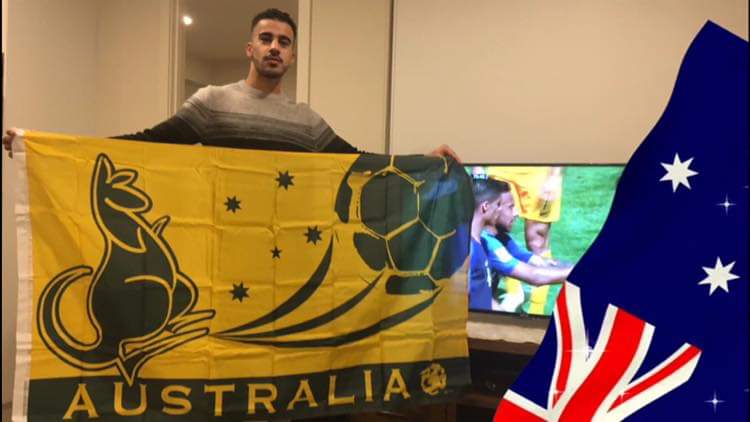18 December 2018 – Latifa Al-Haouli of Sabelberg Morcos Lawyers, with cooperation of the Gulf Institute for Democracy and Human Rights (GIDHR), had lodged an urgent request for ministerial intervention to grant Hakeem Al-Araibi citizenship.
Al-Haouli had submitted the application on Monday 10 December 2018, she has yet to receive any response from the Ministry of Home Affairs until this moment.
Request briefing:
Al-Haouli mentioned in her request that “this request requires emergency government intervention and marks Australia’s stance on protecting legitimate refugees.”
“This is a matter of National Interest, far exceeding the criteria of Public Interest used to assess ministerial interventions,” she continued.
“The applicant is seeking to be granted with Australian citizenship due to ongoing human rights atrocities surrounding his unlawful detention in Thailand, treatment of refugees and prospective extradition to Bahrain,” Al-Haouli added.
Commenting, Fatima Yazbek of the Gulf Institute for Democracy and Human Rights (GIDHR) said: “we urge the Australian government, especially the Minister of Home Affairs Mr Peter Dutton, to grant Hakeem Al-Araibi the Australian citizenship attempting to save his life from the imminent danger he will face if deported to Bahrain. Bahraini prisons lack the minimum standards of prisoners’ rights, and the political prisoners are suffering from miserable conditions and lack of their basic rights”.
“The repression against the opponents of the Gulf States, especially following the murder of the Saudi journalist Jamal Khashoggi and the death penalties issued against Saudi human rights activists, gives a brief of what is awaiting Hakeem Al-Araibi in the Bahraini prisons,” she continued. “We call on all the sports and football community to demand granting Hakeem the Australian citizenship,” she added.
Legal basis:
The request was made under section 21(1) of the Australian Citizenship Act 2007, stipulating that “A person may make an application to the Minister to become an Australian citizen. General Eligibility is outlined in Subsection 21(2)-(8) of the Act listing the prerequisites needed to satisfy the statutory requirements.”
However, Subsection 22 of the aforementioned Act states:
(5A) The Minister may decide that subsection (1C) does not apply in relation to the person if, taking into account the circumstances that resulted in the person’s confinement, the Minister is satisfied that it would be unreasonable for that subsection to apply in relation to the person.
Ministerial discretion–person in Australia would suffer significant hardship or disadvantage
(6) For the purposes of paragraph (1)(c), the Minister may treat a period as one in which the person was present in Australia as a permanent resident if:
(a) the person was present in Australia during that period (except as a permanent resident or an unlawful non-citizen); and
(b) the Minister is satisfied that the person will suffer significant hardship or disadvantage if that period were not treated as one during which the person was present in Australia as a permanent resident.
Background:
In November 2012, Hakeem Al-Araibi was arrested and tortured by the Bahraini authorities, allegedly due to the political activities of his brother. In January 2014, Bahraini authorities sentenced Al-Araibi to 10 years imprisonment in absentia on the charge of vandalising a police station, which he strongly denies. Due to this impending danger, Al-Araibi fled to Australia seeking protection in 2014.
After he fled to Australia, he has spoken publicly about his torture. “They blindfolded me,” he said. “They held me really tight, and one started to beat my legs really hard, saying: ‘You will not play soccer again. We will destroy your future.’” Al-Araibi was very critical of the current president of the Asian Football Confederation, Sheikh Salman Al-Khalifa, especially during his candidacy for FIFA presidency in 2016. He conducted interviews with various international media outlets.
On 27 November 2018, Al-Araibi and his wife travelled from Melbourne for a holiday. Upon their arrival at Bangkok Suvarnabhumi Airport (BKK), he was detained under a “Red Notice”, issued upon Bahrain’s request due to his criminal conviction in 2014. This “Red Notice” was lifted later on 4 December 2018.
On 30 November 2018, Al-Araibi was told by the Thai immigration authorities that he would be able to fly back to Melbourne on 1 December 2018. A few hours before his scheduled departure, however, Al-Araibi was taken to Suan Phlu (Bangkok) Immigration Detention Center where he still remains at risk of extradition.
On the same day, the Bahraini Embassy in Thailand issued statements on Twitter stating that they are “following up with the relevant security authorities” and that “the suspect is wanted for security cases”.
Al-Araibi was transferred, then, to Suan Plu (Bangkok) Immigration Detention Centre, where he was kept in custody until Thai court approved (on 3 December 2018) a temporary remand to detain Al-Araibi for 12 more days in Bangkok.
On 11 December 2018, Al-Araibi was brought to Bangkok Criminal Court (Ratchadaphisek) which decided to extend his detention for 60 more days so Immigration Department can prepare his extradition to Bahrain.
So we urge all the communities, especially the sports and football communities, to strongly demand and call on the Minister of Home Affairs to grant Hakeem Al-Araibi Australian citizenship in order to get him back to his Australian home safely.



 العربية
العربية